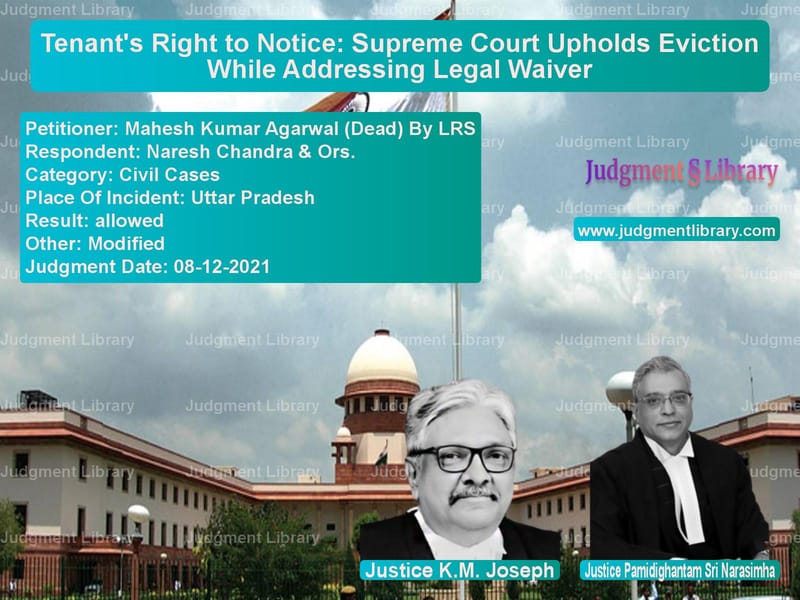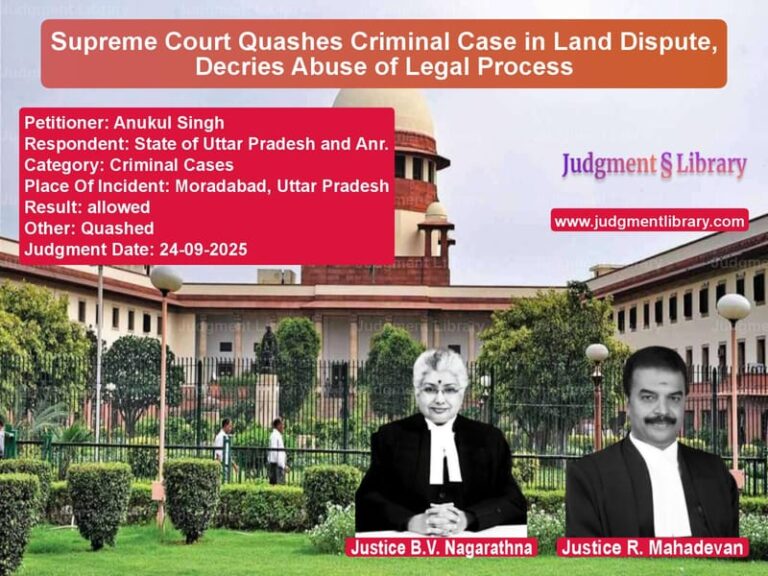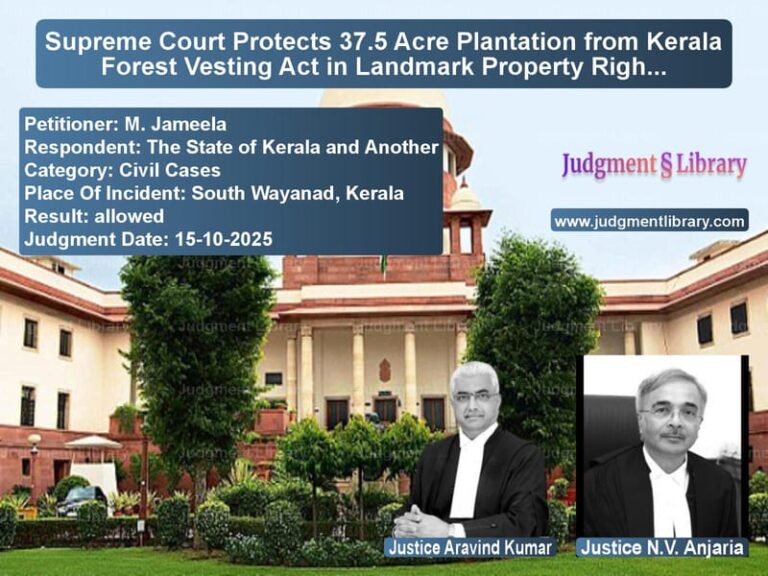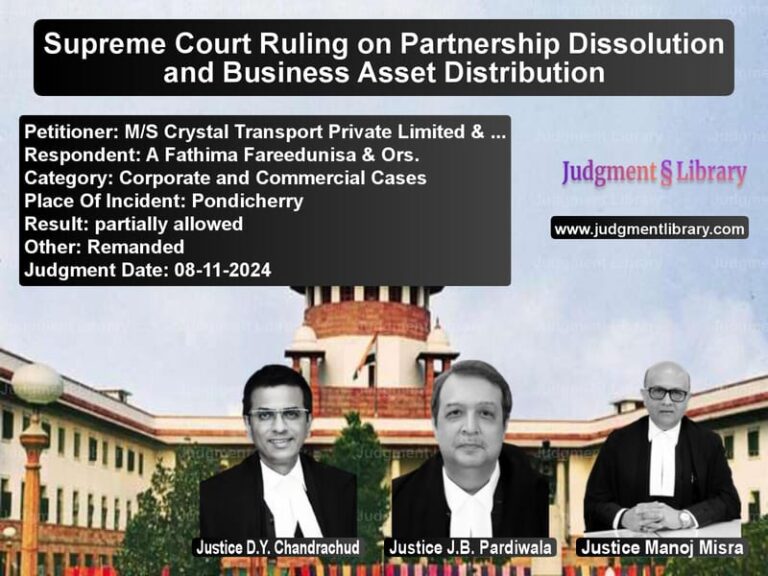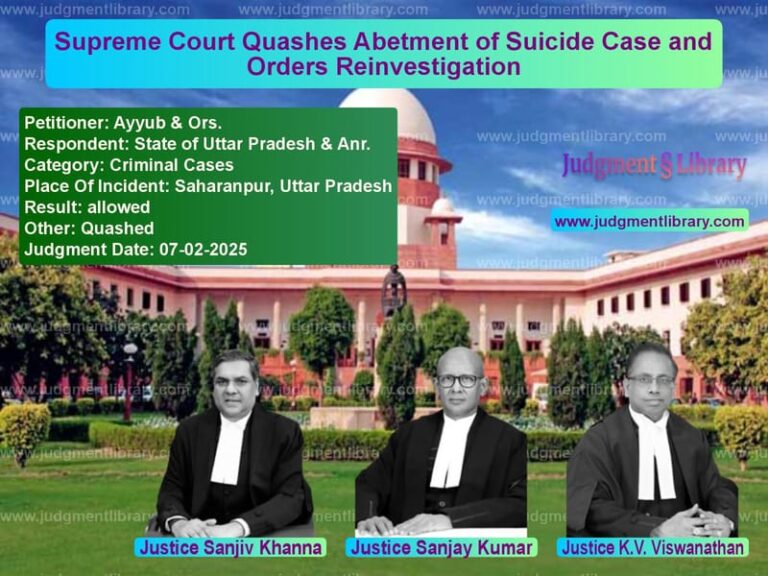Tenant’s Right to Notice: Supreme Court Upholds Eviction While Addressing Legal Waiver
The Supreme Court of India recently adjudicated a crucial case concerning eviction under the U.P. Urban Buildings (Regulation of Letting, Rent, and Eviction) Act, 1972. The case involved a dispute between the landlord, Mahesh Kumar Agarwal (now represented by his legal heirs), and the tenant, Naresh Chandra & Ors. The core issue revolved around whether the failure to serve a six-month notice under Section 21(1)(a) of the Act could be waived by the tenant. The Supreme Court ultimately ruled in favor of the landlord, emphasizing the principle of waiver and awarding compensation to the tenant.
Background of the Case
The dispute arose when the appellant-landlord filed an eviction application under Section 21 of the Act. The property was purchased by the landlord on January 4, 1977, and the eviction proceedings commenced after a legal notice was issued on December 22, 2007. The tenant responded on February 22, 2008, but did not raise any objections regarding the requirement of a six-month notice. The Rent Controller ruled in favor of eviction on May 16, 2013, and the appellate authority upheld the decision on July 21, 2016.
High Court’s Decision
The tenant challenged the decision before the High Court, which overturned the eviction order on the sole ground that the landlord had failed to serve a six-month notice before filing the eviction application. The High Court ruled that the absence of such notice rendered the eviction proceedings invalid.
Read also: https://judgmentlibrary.com/supreme-court-dismisses-review-petition-in-family-property-dispute-case/
Supreme Court’s Observations
The Supreme Court noted that the tenant had not objected to the lack of a six-month notice during the trial or appellate proceedings but raised it for the first time in the writ petition before the High Court. The Court found that:
- The notice, issued on December 22, 2007, was followed by the eviction application on November 20, 2008, well beyond the six-month requirement.
- The tenant had waived the right to object by not raising the issue in the reply notice, written statement, or appeal.
- The concept of waiver applies in this case, as recognized in the precedent set by Martin & Harris Ltd. v. VIth Additional Distt. Judge, where failure to raise procedural objections at an appropriate stage was deemed a waiver.
Key Arguments Presented
Appellant’s Arguments:
- The landlord contended that the eviction application was filed more than six months after the notice, fulfilling the requirement.
- Even if the notice was defective, the tenant waived the objection by failing to raise it earlier.
- Past Supreme Court judgments have upheld that procedural protections for tenants can be waived if not invoked in a timely manner.
Respondent’s Arguments:
- The tenant, relying on an earlier Supreme Court decision in Gopal Krishan Verma v. Tahir, argued that an explicit six-month notice was mandatory.
- The eviction notice issued only mentioned a 30-day period for vacating the premises, failing to comply with the six-month requirement.
- The statutory requirement cannot be waived, as the notice was a fundamental condition for eviction proceedings.
Supreme Court’s Ruling
The Supreme Court overruled the High Court’s decision and reinstated the eviction order issued by the Rent Controller and affirmed by the appellate authority. The Court held that the tenant had effectively waived the right to contest the notice requirement by failing to object in the earlier proceedings. However, recognizing the tenant’s loss of possession, the Court directed the landlord to compensate the tenant with Rs.30,000.
Key Takeaways from the Judgment
- Waiver of procedural rights: If a tenant does not contest a procedural defect in eviction proceedings at the appropriate stage, they may be deemed to have waived their right to object.
- Importance of statutory notices: While statutory notices are mandatory, courts may overlook defects if the tenant has not objected at earlier stages.
- Judicial discipline and precedents: The Supreme Court acknowledged a conflicting precedent but adhered to the principle of waiver established in earlier rulings.
- Compensation for evicted tenants: In non-residential premises, compensation may be awarded to tenants even when eviction is upheld.
This judgment reinforces the importance of raising procedural objections in a timely manner and affirms the doctrine of waiver in tenancy disputes.
Petitioner Name: Mahesh Kumar Agarwal (Dead) By LRS.Respondent Name: Naresh Chandra & Ors..Judgment By: Justice K.M. Joseph, Justice Pamidighantam Sri Narasimha.Place Of Incident: Uttar Pradesh.Judgment Date: 08-12-2021.
Don’t miss out on the full details! Download the complete judgment in PDF format below and gain valuable insights instantly!
Download Judgment: mahesh-kumar-agarwal-vs-naresh-chandra-&-ors-supreme-court-of-india-judgment-dated-08-12-2021.pdf
Directly Download Judgment: Directly download this Judgment
See all petitions in Landlord-Tenant Disputes
See all petitions in Damages and Compensation
See all petitions in Legal Malpractice
See all petitions in Judgment by K.M. Joseph
See all petitions in Judgment by P.S. Narasimha
See all petitions in allowed
See all petitions in Modified
See all petitions in supreme court of India judgments December 2021
See all petitions in 2021 judgments
See all posts in Civil Cases Category
See all allowed petitions in Civil Cases Category
See all Dismissed petitions in Civil Cases Category
See all partially allowed petitions in Civil Cases Category

